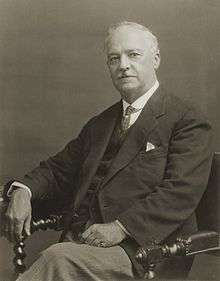William John Sowden

Sir William John Sowden (26 April 1858 – 10 October 1943) was a journalist in South Australia, who was knighted in 1918.
History
He was born in Castlemaine, Victoria, the son of Thomas Sowden (ca.1832 – 3 May 1888), a miner from Cornwall, and his wife Mary Ann, née Hocking. They spent some years in Kapunda, but had returned to Castlemaine by 1867, where William completed his schooling and started in the newspaper trade. They moved to Moonta in 1874, where William started work with the Yorke's Peninsula Advertiser, then in 1879 he joined the Port Adelaide News[1] (both owned by E. H. Derrington, whose feuds with Ebenezer Ward were legendary)[2] and in 1881 started working for the South Australian Register, and was selected to accompany a group of parliamentarians (J. Langdon Parsons, H. E. Bright, L. L. Furner, J. H. Bagster), Professor Ralph Tate and others, to the Northern Territory on the Menmuir (Captain Ellis)[3] as a representative of the Register. On his return he was given a position on the reporting staff and became chief leader writer in 1892. From 1897 to 1899 he was acting editor, and subsequently became editor, remaining in that position until his retirement in September, 1922.[4] He became part-proprietor of the Register in 1899.[5]
He wrote, as "A. Pencil", a regular satirical column as city correspondent for the Kapunda Herald, much as C. R. Wilton, as "Autolycus", wrote for the Mount Marker Courier.[6] He also wrote, as "A. Scribbler", a regular column "Echoes from the Smoking Room" for the Register.
He retired around 1925 to "Castlemaine", the house designed by architect Henry Ernest Fuller in Victor Harbor, where he died.
Recognition
He was knighted in 1918.
Bibliography
In addition to his journalistic work, Sir William wrote numerous books:
- Sowden, William Sir; Tate, Ralph, 1840–1901 (1882), The Northern Territory as it is : a narrative of the South Australian Parliamentary party's trip, and full descriptions of the Northern Territory, its settlements and industries, W.K. Thomas & Co, ISBN 978-1-921315-45-9
- Sowden, William Sir (1919), The roving editors, W.K. Thomas & Co, retrieved 17 February 2015
- Sowden, William Sir (1925), Another Australian abroad : travel notes in Egypt and Palestine 1924-5, Cole's Book Arcade, retrieved 17 February 2015
Other interests
Sir William was:
- from 1908 president of the Board of Governors of the Public Library, Art Gallery and Museum. His interference with the hanging of works in the Art Gallery prompted the curator Henri Van Raalte in 1926 to resign[7] (and to die from a self-inflicted gunshot wound a few years later).
- actively associated with the South Australian Institute for 17 years
- the first president of the South Australian Soldiers' Fund and the Cheer Up Society
- president of the South Australian board of the Australian Natives' Association for five years
- active in the Scout movement; during the absence of the State Governor from Adelaide, he was Acting Chief Scout for South Australia
- founder, first Federal president and State president of the Wattle League
- founder of the Royal Society of St. George, and for a time president
- founder of four Masonic lodges, and Master of three
- active supporter of The Overseas League, the Prisoners' Aid Society, the Sick Poor Fund, the Christmas Cheer Fund
- member of the Geographical Society and the Chamber of Commerce
- for 19 years president of Violet Memory Day
- from 1937 a member of the Adelaide Club.
Sir William, who made several extensive tours abroad, was present in Westminster Abbey for the coronation of King George VI. He led a press delegation to England, accompanied by Sir James Fairfax. In 1918 he visited the battlefields of Europe as guest of the Imperial Government.
His forthright manner and outgoing personality won for him many admirers,[8] but also many enemies, among them Sir Samuel Way.[1]
Family
He married Letitia Grace "Letty" Adams ( – 9 April 1928) of "Corio", Oakleigh, Victoria on 28 April 1886; they had two sons.
He married again, to Margaret Ella Suttie of Mosman, New South Wales on 2 April 1929.
References
- 1 2 Carl Bridge, 'Sowden, Sir William John (1858–1943)', Australian Dictionary of Biography, National Centre of Biography, Australian National University, published first in hardcopy 1990, accessed online 17 February 2015
- ↑ "The Great Libel Action—Ward v. Derrington". Adelaide Observer. SA: National Library of Australia. 1 May 1880. p. 23. Retrieved 17 February 2015.
- ↑ "The Parliamentary Visit.". The Northern Territory Times and Gazette. National Library of Australia. 25 February 1882. p. 2. Retrieved 17 February 2015.
- ↑ "Sir William Sowden Dead". The Advertiser. Adelaide: National Library of Australia. 11 October 1943. p. 3. Retrieved 17 February 2015. Reference to Port Adelaide Advertiser is an error.
- ↑ "Purely Personal". Southern Cross. Adelaide: National Library of Australia. 30 June 1899. p. 7. Retrieved 17 February 2015.
- ↑ "Personal Pars". Quiz and the Lantern. Adelaide: National Library of Australia. 23 October 1891. p. 6. Retrieved 17 February 2015.
- ↑ "Mr. Van Raalte's Resignation". The Register. Adelaide: National Library of Australia. 5 January 1926. p. 7. Retrieved 17 February 2015.
- ↑ "W. J. Sowden a Probable Candidate for the House of Representatives". Kadina and Wallaroo Times. SA: National Library of Australia. 2 March 1901. p. 2. Retrieved 17 February 2015. He never stood for public office.